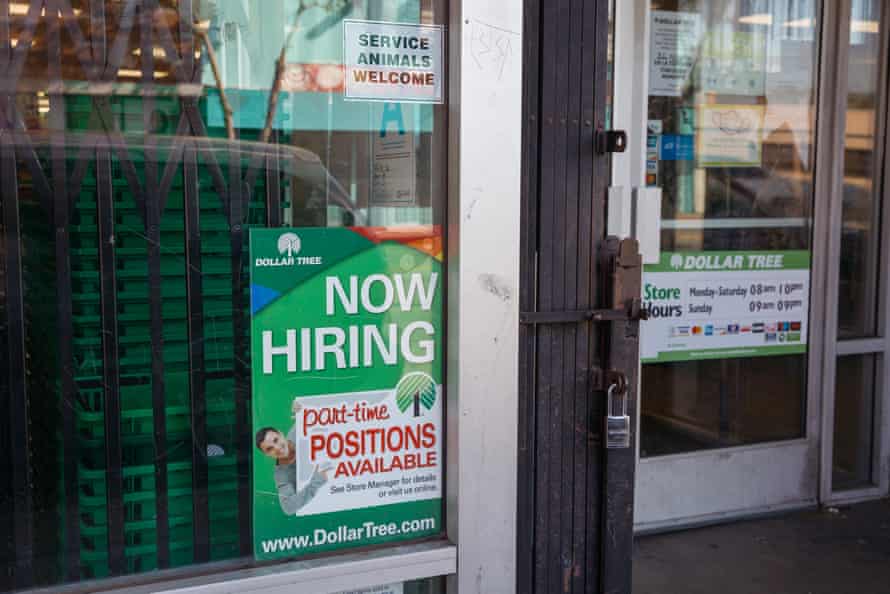US employees are concerned about safety, others have caregiving responsibilities and some are using their job loss as an opportunity to find other work.

–

At restaurants across the country – from Albuquerque, New Mexico, to Forth Worth, Texas – the same sign is popping up: “We are short staffed. Please be patient with the staff that did show up. No one wants to work anymore.”
The implication is that the federal government’s expanded unemployment benefits of $300 each week are keeping people at home instead of behind cash registers and in fast food kitchens.
It’s a concern shared by independent business owners in interviews with local and national media, worried that their efforts to bump wages and increase benefits aren’t luring in the workers they need as Covid-19 restrictions fall and consumer spending soars.
Unfortunately for them, what’s happening is a feature, not a bug, of the US economic system and the blame can’t entirely be placed on a $300 weekly check.
University of Pennsylvania economist, Ioana Marinescu, said: “In the absence of the benefits there would probably be a little bit more applications and hiring would be a little bit easier, but the main drive of the recent change in sentiment is that hiring is accelerating.”
Job openings rose to a two-year high in February, according to the US Labor Department’s job openings and labor turnover survey published last month. And in March, employers added nearly one million new jobs, with many economists expecting similar or better gains in the April jobs report on Friday.
If job openings accelerate faster than people apply for work, there will be pain for business owners. The pandemic has added some quirks to this economic reality.
It is true that a sliver of people would rather stay home for a few months making as much, or more, from unemployment than they would defrosting meat patties or answering phones.
But would-be employees are also concerned about safety – 46% of the population hasn’t received a single vaccine dose and the spread of Covid-19 is uncontrolled in the US. Potential employees also have caregiving responsibilities: this recession has disproportionately affected women, who largely take up these duties and in late March more than half of schools were still doing remote learning or a combination of remote and in-person classes.
Others, like LaShanta Knowles in Cleveland, Ohio, are using their job loss as an opportunity to do something different.
Until September, Knowles had worked the same job at a relocation services company for seven years, unhappy and unsupported, only ever receiving attention for doing things wrong.
“I stayed out of comfort and out of fear if this job didn’t want me, I didn’t think anyone else would,” Knowles said. “Luckily, I don’t feel that way anymore since I went back to school.”
This month, Knowles will receive a certification in web programming and development. Even with the unemployment, the financial situation has been tough, in part because Ohio has been inconsistent with unemployment payments.
This is a problem facing millions across the country because the benefit system is unequipped to respond to this recession. It’s been such an issue that the not-for-profit Ohio Organizing Collaborative stepped in to help people like Knowles navigate the system and invite them to take action to call for something better. And momentum is picking up to consider a national unemployment reform.
Ultimately, though, Knowles feels like luck is on her side. “Unemployment actually helped direct me on the path that I should have been on,” Knowles said.
Unemployment benefits have also allowed out of work people to help support the economy.
University of Chicago researchers found that the unemployment expansion of $600 a week in 2020 allowed people to spend money in a way they wouldn’t without it. That means some of the same businesses complaining about hiring might not earn as much money without unemployment.
The expansion is set to expire in early September and economists are watching to see what that means for business owners and low wage workers, who are still struggling while the economy recovers more quickly for high wage workers.
University of Massachusetts Amherst economist Arindrajit Dube said the fiscal stimulus, including unemployment benefits, could lead to a once in a generation or two generations increase in wages and reduced unemployment rates.
The last time this type of wage growth happened was in the late 1990s when the labor market tightened, with a lot of employers chasing after fewer workers.
“You had a tight enough labor market which led to broad based wage growth of the sort we hadn’t really seen since maybe the 70s,” Dube said. “And that was unusual and yes, employers had a hard time filling vacancies and they had to raise wages a lot and that’s OK.”
In Cleveland, Knowles is most concerned about finding work with her new certificate. She didn’t know when the unemployment expansion ended, and when the Guardian informed her it was September, she exclaimed: “I hope I find a job before then!”
–
–
… we have a small favor to ask. Across the US and around the world, millions rely on the Guardian for independent journalism that stands for truth and integrity. The Guardian has no shareholders or billionaire owner to please, and we invest every penny we earn back into our journalism. Readers chose to support us financially more than 1.5 million times in 2020, joining existing supporters in 180 countries.
With your help, we will continue to provide high-impact reporting that can counter misinformation and offer an authoritative, trustworthy source of news for everyone. With no shareholders or billionaire owner, we set our own agenda and provide truth-seeking journalism that’s free from commercial and political influence. When it’s never mattered more, we can investigate and challenge without fear or favor.
Unlike many others, we have maintained our choice: to keep Guardian journalism open for all readers, regardless of where they live or what they can afford to pay. We do this because we believe in information equality, where everyone deserves to read accurate news and thoughtful analysis. Greater numbers of people are staying well-informed on world events, and being inspired to take meaningful action.
We aim to offer readers a comprehensive, international perspective on critical events shaping our world – from the Black Lives Matter movement, to the new American administration, Brexit, and the world’s slow emergence from a global pandemic. We are committed to upholding our reputation for urgent, powerful reporting on the climate emergency, and made the decision to reject advertising from fossil fuel companies, divest from the oil and gas industries, and set a course to achieve net zero emissions by 2030.
If there were ever a time to join us, it is now. Every contribution, however big or small, powers our journalism and helps sustain our future. Support the Guardian from as little as $1 – and it only takes a minute. Thank you.














